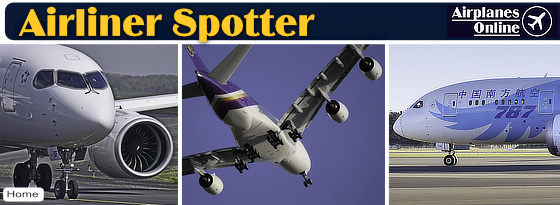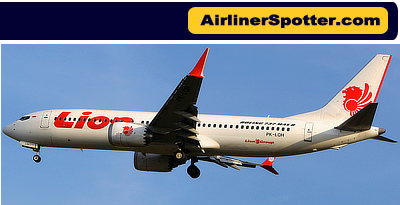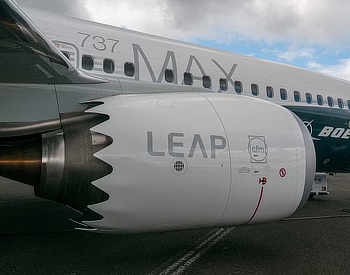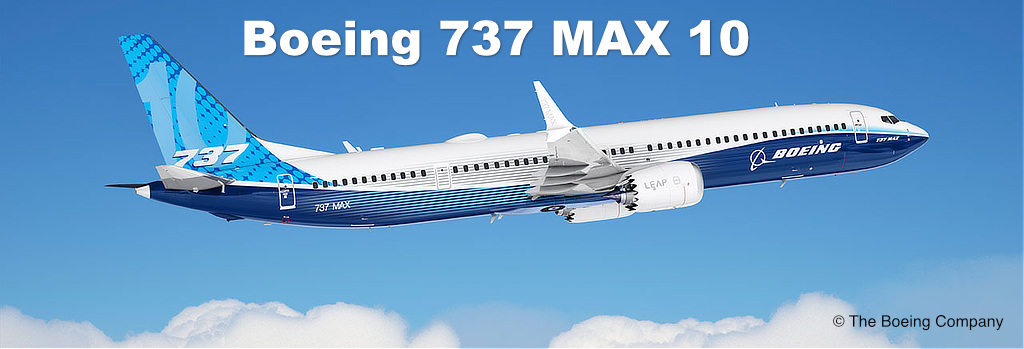Boeing 737 MAX Spotting Guide
Originally developed as a shorter, lower-cost twin-engine airliner derived from the Boeing 707 and 727, Boeing has developed the 737 into a large family of passenger models with capacities from 85 to 215 passengers. It features six-abreast seating.
The 737, also known as the "Baby Boeing", is Boeing's only narrow-body airliner in production, and remains one of the best-selling jet commercial airliners. It currently competes primarily with the Airbus A320 family.
As of June of 2025, Boeing has built over 12,000 737 series jetliners, one of the highest-selling commercial jetliner in commercial aviation history. View current Orders/Deliveries from The Boeing Company
The U.S. Air Force and Navy also use military versions of the 737, including the P-8 Poseidon, the C-40 Clipper and 737 AEW&C.
Boeing 737 Generations
The four main "generations" of the 737 are as follows (click for details):
| Generation | Models | |
| Original | 737-100 and 737-200 | Details |
| Classic | 737-300, 737-400 and 737-500 | Details |
| Next Genration (NG) | 737-600, 737-700, 737-800 and 737-900 | Details |
| MAX | 737-7, 737-8, 737-9 and 737-10 | Details Below |
Some General Boeing 737 Spotting Tips
| The Boeing 737 is a narrow-body jet airliner featuring a pointed nose, one engine under each wing, and a triangular section on the front of the tail. It features two very short twin-wheel main landing gears, forcing the engines to be positioned mostly in front of the wings. |
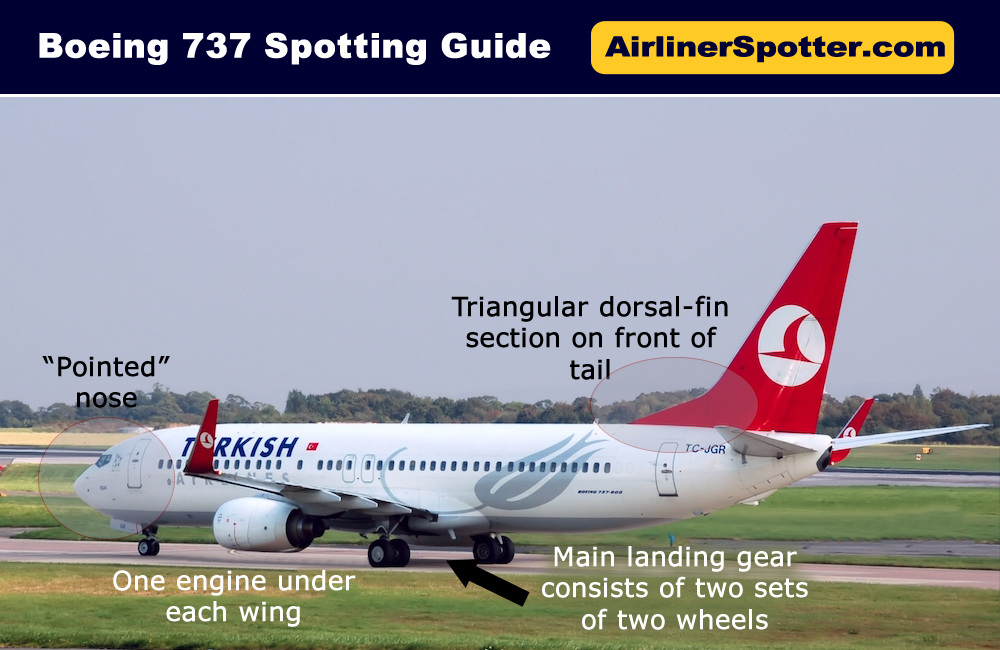 |
| Retracted main landing gear on a Boeing 737 are not enclosed in the fuselage, but are open-air |
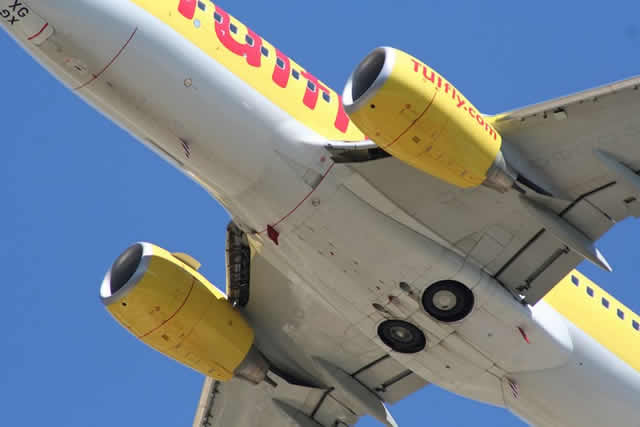 |
Boeing 737 MAX Program
Boeing announced its new, fuel-efficient 737 MAX Family in 2011: 737 MAX 7, 737 MAX 8, 737 MAX 9, and 737 MAX 10.
|
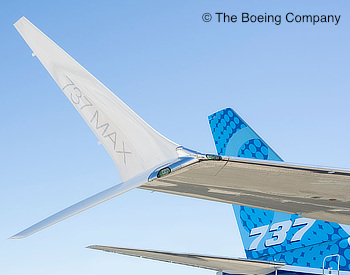 Boeing 737 MAX Split Winglets |
The aircraft achieves higher efficiency due to its new wing, split-tip winglets and engine design. It features the new Boeing Sky Interior. The MAX series is powered by LEAP-1B engines made by CFM, which is co-owned by General Electric and France's Safran.
The 737 MAX family delivers enhanced efficiency, improved environmental performance and increased passenger comfort to the single-aisle market.
Incorporating advanced technology winglets and efficient engines, the 737 MAX family offers excellent economics, reducing fuel use and emissions by 20 percent while producing a 50 percent smaller noise footprint than the airplanes it replaces.
Additionally, 737 MAX family offers up to 14 percent lower airframe maintenance costs than the competition. Passengers enjoy the Boeing Sky Interior, highlighted by modern sculpted sidewalls and window reveals, LED lighting that enhances the sense of spaciousness and larger pivoting overhead storage bins.
As of July 2025, Boeing has received a total of 6,749 MAX orders, and delivered 1,886 MAX airliners. View current Orders/Deliveries from The Boeing Company
Boeing 737 MAX Model Characteristics & Spotting Guide
| 737 MAX Model | Overall Length | Passengers |
| MAX 7 | 116' 8" (35.56 m) | 138 - 172 |
| MAX 8 | 129' 8" (39.52 m) | 162 - 210 |
| MAX 9 | 138' 4" (42.16 m) | 178 - 220 |
| MAX 10 | 143' 8" (43.8 m) | 188 - 230 |
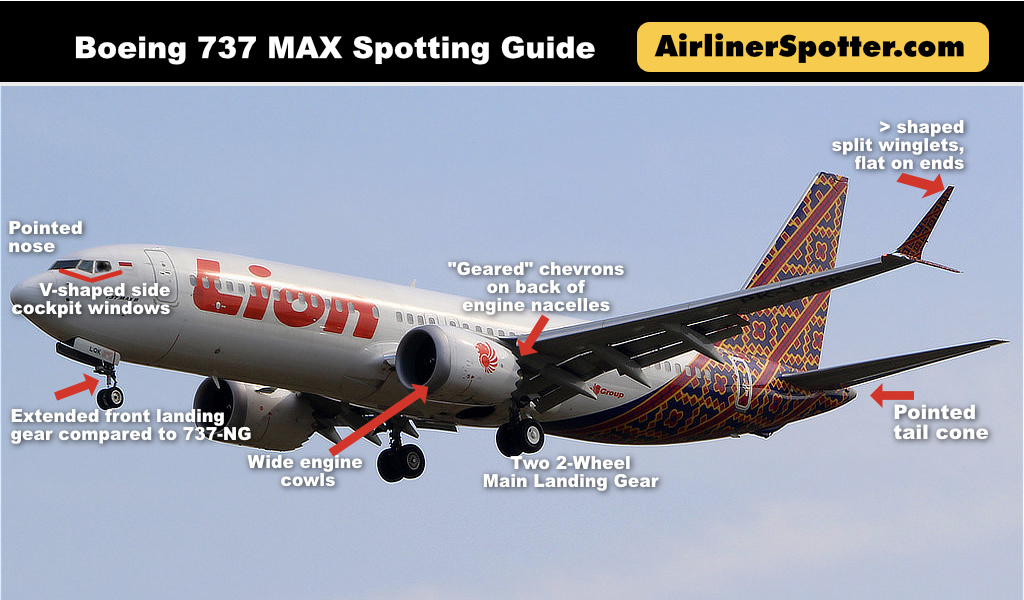 |
Boeing 737 MAX 7
The smallest member of the MAX family is the 737 MAX 7, this aircraft is designed to carry between 138-172 passengers. It is 116 feet 8 inches (35.56 m) in length.
The initial flight of the 737 MAX 7 was on March 16, 2018. Currently awaiting FAA certification.
| Boeing 737 MAX 7 (photo courtesy of the Boeing Company) |
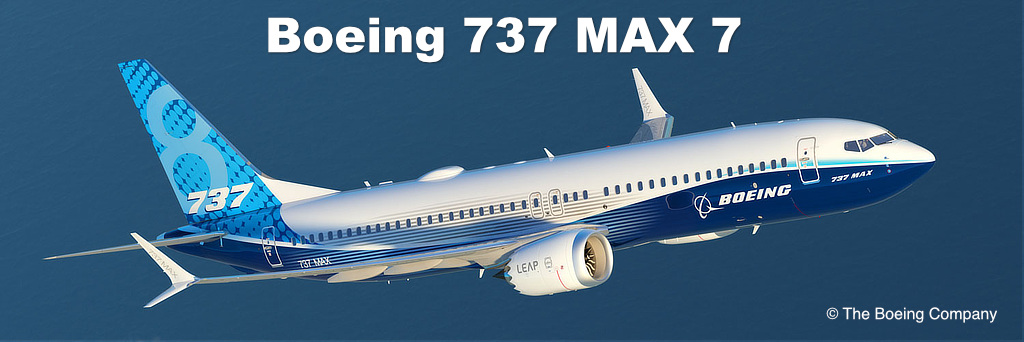 |
Boeing 737 MAX 8
The MAX 8 is designed to carry between 162-210 passengers. It is 129 feet 8 inches (39.52 m) in length. The first flight of the 737 MAX 8 took place in 2016, and four aircraft were engaged in testing. Certification of the 737 MAX 8 was given by the FAA on March 9, 2017.
Initial delivery of the 737 MAX 8 was to Malasia-based Malindo Air, rebranding as Batik Air Malaysia, in May of 2017.
| Boeing 737 MAX 8 of Southwest Airlines |
 |
| Boeing 737 MAX 8 and 737-800 Side-by-Side Comparison |
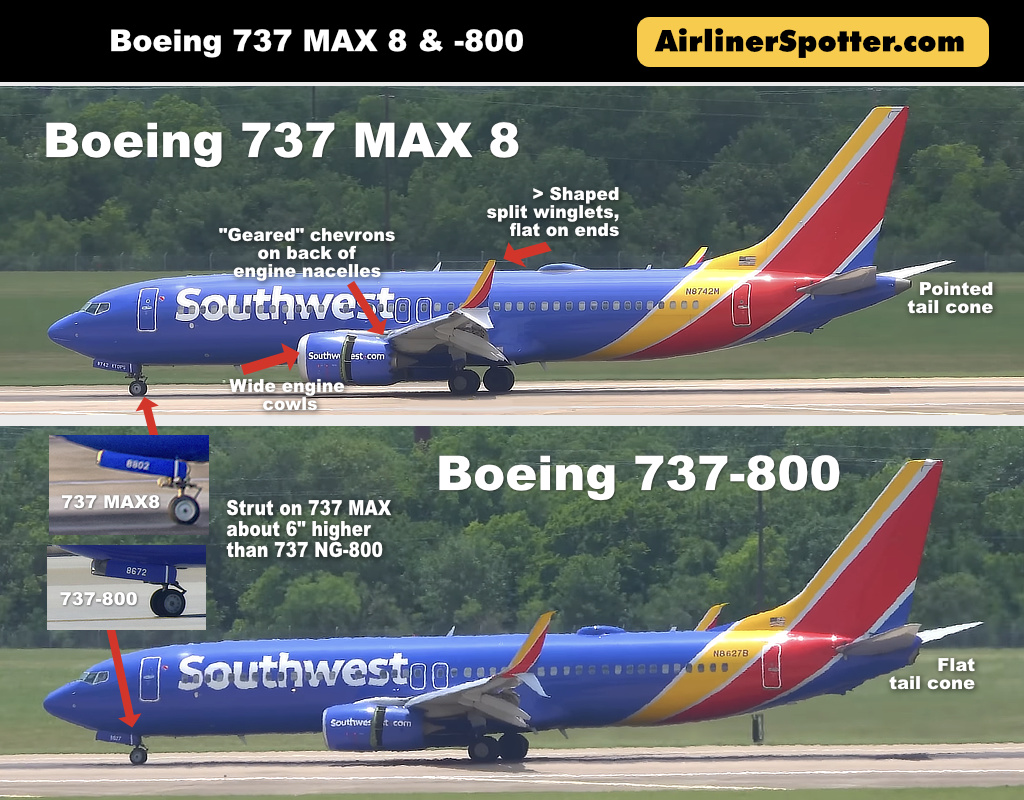 |
Boeing 737 MAX 9
The MAX 9 is designed to carry between 178-220 passengers. It is 138 feet 4 inches (42.16 m) in length. The rollout of the first 787 MAX 9 occured on March 7, 2017, and the first flight took place on April 13, 2017 from Renton, Washington.
The MAX 9 door configuration is the same as other MAX models, but with the addition of an exit door or plug behind the wing.
The first 737 MAX 9 was delivered on March 21, 2018 to the Lion Air Group.
| Boeing 737 MAX 9 of Alaska Airlines (photo courtesty of Alaska Airlines) |
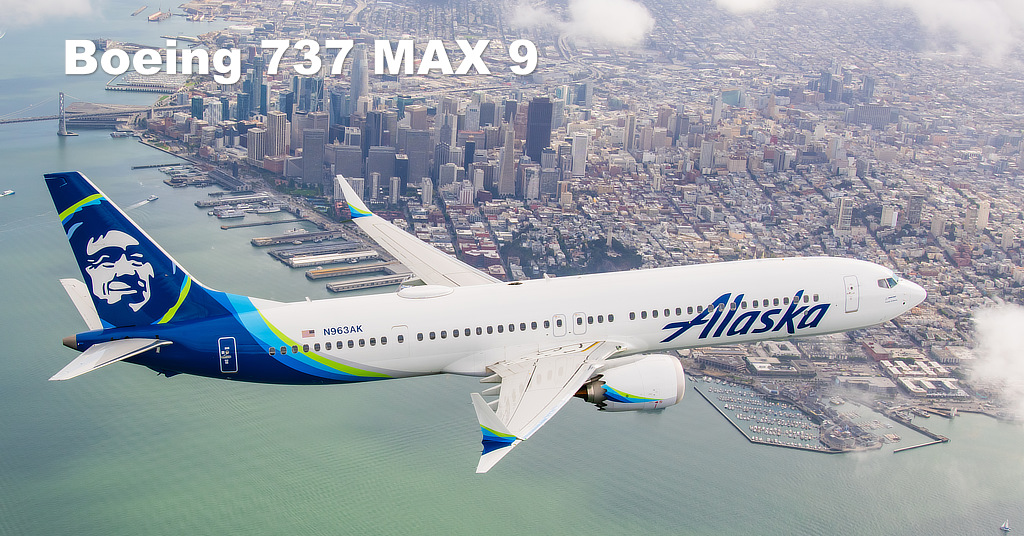 |
Boeing 737 MAX 8 and MAX 9 Side-by-Side Comparison
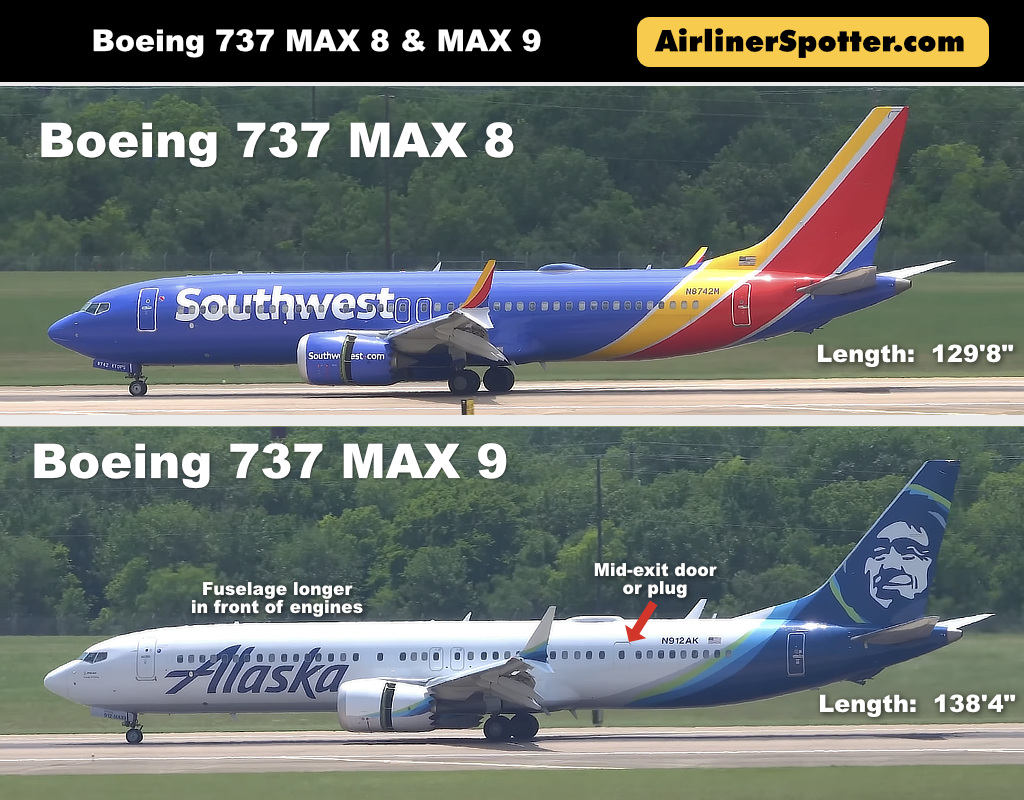 |
The Boeing 737 MAX 10At the Paris Air Show in June of 2017, Boeing officials announced the development of a stretched MAX airliner, the 737 MAX 10. The airliner would seat up to 230 passengers, and have a total length of 143 feet 8 inches (43.8 m). It was first displayed at Boeing's Renton plant on November 22, 2019. The MAX 10 flew for the first time on June 18, 2021, from Renton Municipal Airport to Boeing Field for a 2.5 hour test flight. Currently awaiting FAA certification.
|
